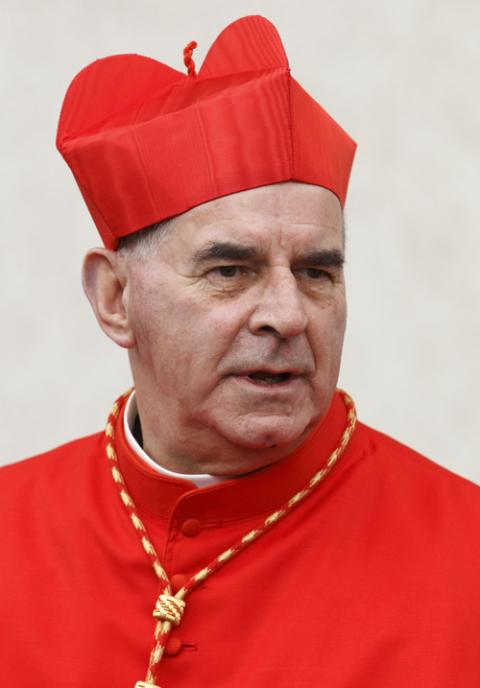Representing the Holy See, Cardinal Vincent Nichols of Westminster presided at the funeral Mass April 5 in the north of England for the exiled Keith Patrick O'Brien, the Irish-born former cardinal archbishop of St. Andrews and Edinburgh in Scotland.
O'Brien, 80, died March 19 five years after he resigned as archbishop after admitting to sexual misconduct with adult men, and three years after resigning "the rights and privileges of a cardinal." News of O'Brien's misconduct broke just before the election of Pope Francis and he never attended the conclave, the first papal elector to "give up" his red hat since 1927.
After the funeral, O'Brien's body was driven to Scotland for burial the following day in a grave with his late father and mother at Mount Vernon Cemetery, Edinburgh, rather than in the city's cathedral.
During a somber service at St Michael's Church, Newcastle-upon-Tyne, Nichols urged mourners to pray for Obrien's soul and for those he offended during his life.
Among the 500 mourners were his successor at Archbishop Leo Cushley of St. Andews and Edinburgh, Archbishop Edward Adams, the apostolic nuncio to Britain, and Cardinal Seán Brady, the retired Archbishop of Armagh, Ireland.
Among 70 priest-concelebrants was the parish priest of San Sebastiano al Palatino, the late cardinal's titular church in Rome.
"In recent days, the life of Cardinal Keith has been laid bare," said Nichols, referring to extensive media coverage following the cardinal's death. "We all know its lights and its darkness; we need not spend time talking about them even more for he has given us the key words."
Allegations about O'Brien's "inappropriate acts" during the 1980s were made by three serving priests and a seminarian under his ecclesiastical authority.

Cardinal Keith O'Brien of St. Andrews and Edinburgh, Scotland, is pictured after a Mass in St. Peter's Basilica at the Vatican in this Nov. 21, 2010, file photo. (CNS/Paul Haring)
The Vatican conducted an inquiry and apostolic visitation, resulting in an unpublished report that reputedly dealt with about 40 allegations and O'Brien's confession to having an in-house lover who was a priest at his St. Bennet's residence in Edinburgh.
Nichols quoted from O'Brien's last will and testament in which he asked "forgiveness of all I have offended in this life" and thanked "God for the many graces and blessings he has given me especially the sacrament of holy orders."
A Belfast host who once entertained O'Brien at the Wellington Park Hotel recalled an insight into O'Brien's public life and sense of theater. O'Brien was to speak at a debate at Queens University with a baroness, a bishop of the Church of Ireland, a former Presbyterian moderator and a former religious affairs correspondent of The Irish Times.
Preparing for the event, O'Brien asked his host, "Do you want me to put on my gear?" This was a reference to donning his robes and red hat to instill an aura of deference among even the most skeptical of Ulster savants. It was quickly agreed that O'Brien should wear a black clerical suit and white collar for what was a lengthy debate. He delivered his speech faultlessly.
Some hours after the debate, speakers adjourned for a drink, and O'Brien retreated to his hotel to have a good night's sleep ahead of a 4 a.m. rise to fly to Africa, as head of the Scottish Catholic Church's development agency.
O'Brien was born on March 17, 1938, in Ballycastle, County Antrim, Northern Ireland, where his father, a sailor, was stationed. The elder O'Brien had received a British Distinguished Services Medal for his participation in Arctic convoys during the World War II. His father's naval career took the family to a number of port cities until finally landing in Edinburgh, where he studied chemistry at Edinburgh University and then philosophy and theology at Drygrange Seminary.
Advertisement
O'Brien was ordained in April 1965 by Cardinal Gordon Gray, Scotland's first cardinal since the Reformation. After a period teaching math and parish work, he was named rector of Blairs College, then the junior seminary for Scotland near Aberdeen. In 1985, Pope John Paul II named him Gray's successor.
Initially, overshadowed by Cardinal Thomas Winning of Glasgow, O'Brien shared the west coast cleric's populist mix of liberality on social issues with hard-line intransigence towards gays and same-sex marriage. Like Winning, O'Brien urged his flock to abandon the Labor Party in preference to the Scottish National Party, and he socialized with Alex Salmond, the politician who served as the first minister of Scotland from 2007 to 2014. He was fearless in denouncing the U.S. nuclear missiles sited on the Clyde.
Pope John Paul II named O'Brien a cardinal in 2003. At the 2005 conclave O'Brien is said to have voted for Cardinal Joseph Ratzinger as Pope Benedict XVI. In 2010, O'Brien was filmed with Pope Benedict in the popemobile as it traveled along Princes Street, both wearing scarves of specially manufactured papal tartan.
After the funeral, Canon Matt McManus expressed regrets that O'Brien was not buried in Edinburgh's St Mary Cathedral, as he had requested, but admitted that the requiem Mass was very well done. "The mood was somber. There was a feeling it was in the wrong place. But apart from that it was extremely well done, extremely dignified."
[John Cooney is a retired religious affairs correspondent of The Irish Times and of the Glasgow-based The Herald.]





